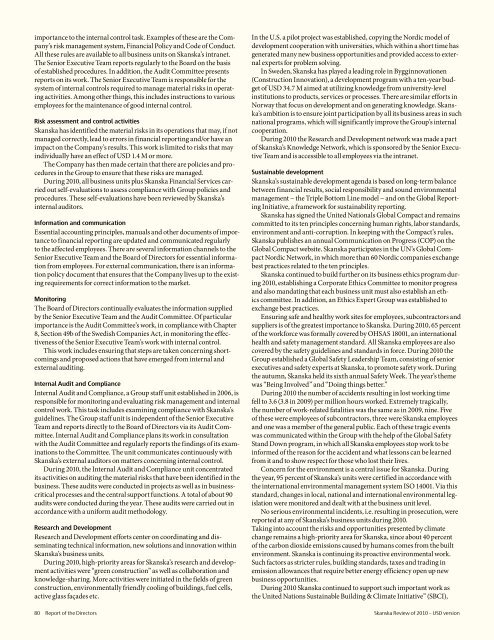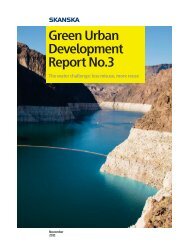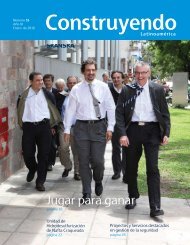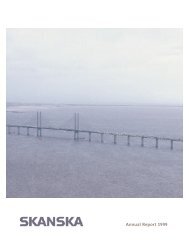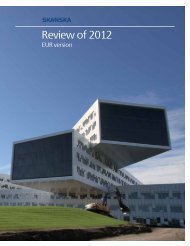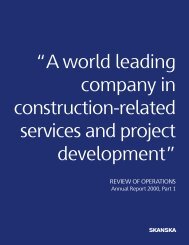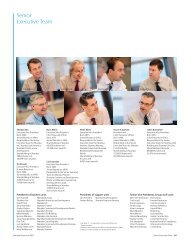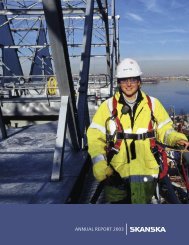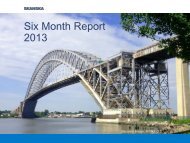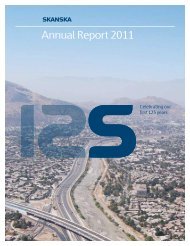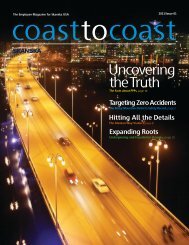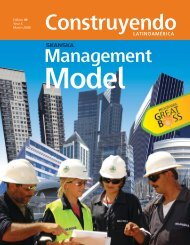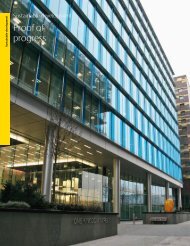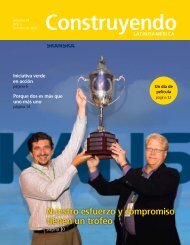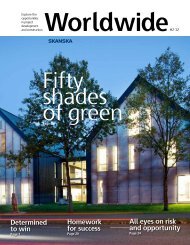Review of 2010 â USD version - Skanska
Review of 2010 â USD version - Skanska
Review of 2010 â USD version - Skanska
Create successful ePaper yourself
Turn your PDF publications into a flip-book with our unique Google optimized e-Paper software.
importance to the internal control task. Examples <strong>of</strong> these are the Company’s<br />
risk management system, Financial Policy and Code <strong>of</strong> Conduct.<br />
All these rules are available to all business units on <strong>Skanska</strong>’s intranet.<br />
The Senior Executive Team reports regularly to the Board on the basis<br />
<strong>of</strong> established procedures. In addition, the Audit Committee presents<br />
reports on its work. The Senior Executive Team is responsible for the<br />
system <strong>of</strong> internal controls required to manage material risks in operating<br />
activities. Among other things, this includes instructions to various<br />
employees for the maintenance <strong>of</strong> good internal control.<br />
Risk assessment and control activities<br />
<strong>Skanska</strong> has identified the material risks in its operations that may, if not<br />
managed correctly, lead to errors in financial reporting and/or have an<br />
impact on the Company’s results. This work is limited to risks that may<br />
individually have an effect <strong>of</strong> <strong>USD</strong> 1.4 M or more.<br />
The Company has then made certain that there are policies and procedures<br />
in the Group to ensure that these risks are managed.<br />
During <strong>2010</strong>, all business units plus <strong>Skanska</strong> Financial Services carried<br />
out self-evaluations to assess compliance with Group policies and<br />
procedures. These self-evaluations have been reviewed by <strong>Skanska</strong>’s<br />
internal auditors.<br />
Information and communication<br />
Essential accounting principles, manuals and other documents <strong>of</strong> importance<br />
to financial reporting are updated and communicated regularly<br />
to the affected employees. There are several information channels to the<br />
Senior Executive Team and the Board <strong>of</strong> Directors for essential information<br />
from employees. For external communication, there is an information<br />
policy document that ensures that the Company lives up to the existing<br />
requirements for correct information to the market.<br />
Monitoring<br />
The Board <strong>of</strong> Directors continually evaluates the information supplied<br />
by the Senior Executive Team and the Audit Committee. Of particular<br />
importance is the Audit Committee’s work, in compliance with Chapter<br />
8, Section 49b <strong>of</strong> the Swedish Companies Act, in monitoring the effectiveness<br />
<strong>of</strong> the Senior Executive Team’s work with internal control.<br />
This work includes ensuring that steps are taken concerning shortcomings<br />
and proposed actions that have emerged from internal and<br />
external auditing.<br />
Internal Audit and Compliance<br />
Internal Audit and Compliance, a Group staff unit established in 2006, is<br />
responsible for monitoring and evaluating risk management and internal<br />
control work. This task includes examining compliance with <strong>Skanska</strong>’s<br />
guidelines. The Group staff unit is independent <strong>of</strong> the Senior Executive<br />
Team and reports directly to the Board <strong>of</strong> Directors via its Audit Committee.<br />
Internal Audit and Compliance plans its work in consultation<br />
with the Audit Committee and regularly reports the findings <strong>of</strong> its examinations<br />
to the Committee. The unit communicates continuously with<br />
<strong>Skanska</strong>’s external auditors on matters concerning internal control.<br />
During <strong>2010</strong>, the Internal Audit and Compliance unit concentrated<br />
its activities on auditing the material risks that have been identified in the<br />
business. These audits were conducted in projects as well as in businesscritical<br />
processes and the central support functions. A total <strong>of</strong> about 90<br />
audits were conducted during the year. These audits were carried out in<br />
accordance with a uniform audit methodology.<br />
Research and Development<br />
Research and Development efforts center on coordinating and disseminating<br />
technical information, new solutions and innovation within<br />
<strong>Skanska</strong>’s business units.<br />
During <strong>2010</strong>, high-priority areas for <strong>Skanska</strong>’s research and development<br />
activities were “green construction” as well as collaboration and<br />
knowledge-sharing. More activities were initiated in the fields <strong>of</strong> green<br />
construction, environmentally friendly cooling <strong>of</strong> buildings, fuel cells,<br />
active glass façades etc.<br />
In the U.S. a pilot project was established, copying the Nordic model <strong>of</strong><br />
development cooperation with universities, which within a short time has<br />
generated many new business opportunities and provided access to external<br />
experts for problem solving.<br />
In Sweden, <strong>Skanska</strong> has played a leading role in Bygginnovationen<br />
(Construction Innovation), a development program with a ten-year budget<br />
<strong>of</strong> <strong>USD</strong> 34.7 M aimed at utilizing knowledge from university-level<br />
institutions to products, services or processes. There are similar efforts in<br />
Norway that focus on development and on generating knowledge. <strong>Skanska</strong>’s<br />
ambition is to ensure joint participation by all its business areas in such<br />
national programs, which will significantly improve the Group’s internal<br />
cooperation.<br />
During <strong>2010</strong> the Research and Development network was made a part<br />
<strong>of</strong> <strong>Skanska</strong>’s Knowledge Network, which is sponsored by the Senior Executive<br />
Team and is accessible to all employees via the intranet.<br />
Sustainable development<br />
<strong>Skanska</strong>’s sustainable development agenda is based on long-term balance<br />
between financial results, social responsibility and sound environmental<br />
management − the Triple Bottom Line model − and on the Global Reporting<br />
Initiative, a framework for sustainability reporting.<br />
<strong>Skanska</strong> has signed the United Nationals Global Compact and remains<br />
committed to its ten principles concerning human rights, labor standards,<br />
environment and anti-corruption. In keeping with the Compact’s rules,<br />
<strong>Skanska</strong> publishes an annual Communication on Progress (COP) on the<br />
Global Compact website. <strong>Skanska</strong> participates in the UN’s Global Compact<br />
Nordic Network, in which more than 60 Nordic companies exchange<br />
best practices related to the ten principles.<br />
<strong>Skanska</strong> continued to build further on its business ethics program during<br />
<strong>2010</strong>, establishing a Corporate Ethics Committee to monitor progress<br />
and also mandating that each business unit must also establish an ethics<br />
committee. In addition, an Ethics Expert Group was established to<br />
exchange best practices.<br />
Ensuring safe and healthy work sites for employees, subcontractors and<br />
suppliers is <strong>of</strong> the greatest importance to <strong>Skanska</strong>. During <strong>2010</strong>, 65 percent<br />
<strong>of</strong> the workforce was formally covered by OHSAS 18001, an international<br />
health and safety management standard. All <strong>Skanska</strong> employees are also<br />
covered by the safety guidelines and standards in force. During <strong>2010</strong> the<br />
Group established a Global Safety Leadership Team, consisting <strong>of</strong> senior<br />
executives and safety experts at <strong>Skanska</strong>, to promote safety work. During<br />
the autumn, <strong>Skanska</strong> held its sixth annual Safety Week. The year’s theme<br />
was “Being Involved” and “Doing things better.”<br />
During <strong>2010</strong> the number <strong>of</strong> accidents resulting in lost working time<br />
fell to 3.6 (3.8 in 2009) per million hours worked. Extremely tragically,<br />
the number <strong>of</strong> work-related fatalities was the same as in 2009, nine. Five<br />
<strong>of</strong> these were employees <strong>of</strong> subcontractors, three were <strong>Skanska</strong> employees<br />
and one was a member <strong>of</strong> the general public. Each <strong>of</strong> these tragic events<br />
was communicated within the Group with the help <strong>of</strong> the Global Safety<br />
Stand Down program, in which all <strong>Skanska</strong> employees stop work to be<br />
informed <strong>of</strong> the reason for the accident and what lessons can be learned<br />
from it and to show respect for those who lost their lives.<br />
Concern for the environment is a central issue for <strong>Skanska</strong>. During<br />
the year, 95 percent <strong>of</strong> <strong>Skanska</strong>’s units were certified in accordance with<br />
the international environmental management system ISO 14001. Via this<br />
standard, changes in local, national and international environmental legislation<br />
were monitored and dealt with at the business unit level.<br />
No serious environmental incidents, i.e. resulting in prosecution, were<br />
reported at any <strong>of</strong> <strong>Skanska</strong>’s business units during <strong>2010</strong>.<br />
Taking into account the risks and opportunities presented by climate<br />
change remains a high-priority area for <strong>Skanska</strong>, since about 40 percent<br />
<strong>of</strong> the carbon dioxide emissions caused by humans comes from the built<br />
environment. <strong>Skanska</strong> is continuing its proactive environmental work.<br />
Such factors as stricter rules, building standards, taxes and trading in<br />
emission allowances that require better energy efficiency open up new<br />
business opportunities.<br />
During <strong>2010</strong> <strong>Skanska</strong> continued to support such important work as<br />
the United Nations Sustainable Building & Climate Initiative” (SBCI),<br />
80 Report <strong>of</strong> the Directors <strong>Skanska</strong> <strong>Review</strong> <strong>of</strong> <strong>2010</strong> – <strong>USD</strong> <strong>version</strong>


